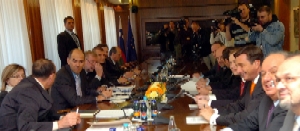Following an invitation from the Prime Minister of the Republic of Slovenia, Janez Janša, the leaders of parliamentary parties, the leader of the parliamentary group of unaffiliated MPs and the MP representing the Hungarian national minority discussed the draft agreement on cooperation during the preparations for Slovenia's presidency of the Council of the EU, exchanged views on the legislation on provinces, Slovenian-Croatian relations, and the constitutional act on the so-called 'erased'.

(Photo: Nebojša Tejić/Salomon 2000)
The PM said that the meeting had been useful and that progress had been made on some points. All participants agreed to the signing of the said agreement, and undertook to submit any additional amendments within seven to ten days. This will form the basis for signing the agreement. The PM said he was glad that no reservations were expressed in this respect.
The meeting was also an opportunity to discuss unresolved issues pertaining to legislation on Slovenian province. The majority of participants agreed that fourteen provinces was the highest number that should be created. The PM said that the number would be reached by compromise, but would not be greater than fourteen. Support was also expressed for a full transfer of authority to promote development from ministries and administrative units to provinces. "We are planning to shift towards a single-tier system; however, this will be reached not in one, but in two steps. The first step will take somewhat longer, as it will include the transfer of all powers pertaining to development," said the PM.
With regard to financing the provinces, it was unanimously agreed in principle that no extra costs should be incurred. Hence, all activities transferred from the state to the provincial level will carry with them funds and jobs. This is the only way to maintain a non-biased position. "We are establishing provinces to promote faster development and higher economic growth, but mainly to move towards the objective set in the 1991 Constitution, i.e. well-balanced development and equal opportunities for all, irrespective of one's place of residence," stressed Mr Janša. The PM also said that the project would demand even more effort, while individual issues will be coordinated by parliamentary procedures. All participants agreed that this is a demanding task, which has become a commitment imposed by the amended constitution.
"As far as relations with the Republic of Croatia are concerned, the majority opinion is that at this stage there is no point in adopting any resolutions or declarations, as at present no outstanding issues can be resolved. We will strengthen bilateral efforts to find solutions to outstanding issues," said the PM, adding that not all participants agreed with this view, since two different versions of the resolution on Slovenian-Croatian relations have been submitted to parliament for consideration. "According to the Rules of Procedure of the National Assembly, every parliamentary group has the right to insist that the resolution be discussed. If they do not waive that right – and we have asked them to consider this possibility – then the National Assembly will discuss it. However, this does ensure that the resolution will be passed, at least if voting reflects the opinion expressed today," stressed the PM. When asked about the possibility of arbitration, Mr Janša said that this particular means of resolving the issue had not been discussed. However, the participants did consider bringing in a third party should the issue not be resolved otherwise. "With regard to this, I can say that apart from a few exceptions, the majority is not against this possibility. That is to say, Slovenia does not fear arbitration, as we have very solid arguments."
With regard to resolving the issue of the so-called 'erased', the PM said that because of the changed distribution of power in the National Assembly, there was more willingness to attempt to find a solution with a constitutional act under the condition that substantive solutions be further coordinated. The government is open to amending substantive solutions, which are contained in the draft constitutional act, which is why another round of coordination will take place. "Judging by the willingness expressed today to seek a solution by means of a constitutional act, I believe that a two-thirds majority in favour of such a solution can be reached, on condition that we agree on the content," concluded the Prime Minister.